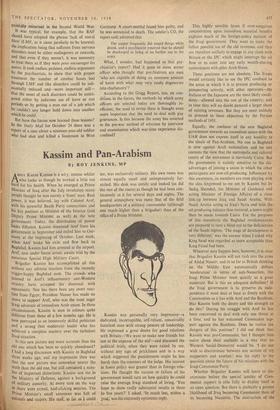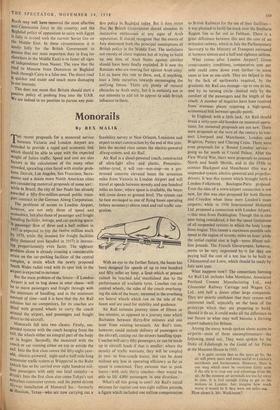Kassim and Pan-Arabism
By ROY JENKINS, MP
ABDUL KARIM KASSIM is a wiry, intense soldier who looks as though he worked a little too hard for his health. When he emerged as Prime Minister of Iraq after the July revolution many People thought he was merely a 'front' man. Real Power, it was believed, lay with Colonel Aref, with his powerful Beath Party connections and his key position as Minister of the Interior (and Deputy Prime Minister as well) in the new gotiernment. Today, the distribution of power looks different. Kassim dismissed Aref from his government in September and exiled him to Ger- many at the beginning of October. Last week, when Aref broke his exile and flew back to Baghdad, Kassim had him arrested at the airport. Aref, now under house arrest, awaits trial by the notorious Special High Military Court.
Brigadier Kassim has accomplished all this without any adverse reaction from the recently trigger-happy Baghdad mob. The crowds who listened to Aref's inflammatory anti-Western oratory have accepted his dismissal with equanimity. Nor has there been any overt reac- tion from Egypt; President Nasser has made no move to support Aref, who was the most eager Iraqi advocate of immediate Arab union. In these circumstances, Kassim is seen in colours quite different from those of a few months ago. He is now portrayed as an immensely skilful politician and a strong (but moderate) leader who has .achieved a complete mastery over the turbulent Iraqi situation.
Is this new picture any more accurate than the old one which has been so quickly abandoned? I had a long discussion with Kassim in Baghdad three weeks ago, and my impression then was that the new picture was somewhat nearer the truth than the old one, but still contained a num- ber of important distortions. Kassim saw me in the Ministry of Defence, against a background of military austerity. At every turn on the way In there were armed, heel-clicking sentries. The Prime Minister's small anteroom was full of colonels and majors. His staff, as far as I could see, was exclusively' military. His own room was almost equally small and unimpressively fur- nished. His desk was untidy and looked (as did the rest of the room) as though he had been con- tinuously at it for several days and nights. The general atmosphere was more that of the field headquarters of a military commander (although one much higher than a brigadier) than of the office of a Prime Minister.
Kassim was personally very impressive—a dedicated, incorruptible, self-reliant, conceivably fanatical man with strong powers of leadership. He expressed a great desire for good relations with Britain—'We want to make new friends but not at the expense of the old'—and discussed the political trials, when they were raised by me, without any sign of prickliness and in a way which suggested the punishments might be less harsh than the manners of the judge. His interest in home policy was greater than in foreign rela- tions. He thought the success or failure of his government would turn on how quickly he could raise the average Iraqi standard of living. 'You hope to show really substantial results in three to five years?' I asked. 'In much less, within a year,' was his extremely optimistic reply. This highly sensible (even if over-sanguine) concentration upon immediate material benefits explains much of the foreign-policy outlook of the Iraqi government. They want to make the fullest possible use of the old revenues, and they are therefore unlikely to engage in any clash with Britain or the IPC which might interrupt the oil flow or to enter into any early wealth-sharing commitment with other Arab States.
These positions are not absolute. The Iraqis would certainly like to see the IPC confined to the areas in which it is at present producing or prospecting actively, with other operators—the Italians or the Japanese are the most likely candi- dates—allowed into the rest of the country; and in time they will no doubt demand a larger share of existing revenues. But they are most unlikely to proceed to these objectives by the Persian methods of 1951.
Equally, the coolness of the new Baghdad government towards an immediate union with the UAR does not express itself in any hostility to the ideals of Pan-Arabism. No one in Baghdad is now against Arab nationalism and no one contests the view that the metropolis and cultural centre of the movement is inevitably Cairo. But the government is acutely sensitive to the dis- advantages of joining a union in which the other participants are non-oil-producing. Influenced by this awareness, its members are even playing with the idea (expressed to me not by Kassim but by Sadiq Shenshel, the Minister of Guidance and acting Minister of Foreign Affairs) of a close link-up between Iraq and Saudi Arabia. With Saudi Arabia acting as Iraq's Syria and with the oil-producing balance thus restored, a move might then be made towards Cairo. For the purposes of this manoeuvre the Baghdad revolutionaries are prepared to turn a blind eye to the deficiencies of the Saudi regime. 'The stage of development is very different,' was the answer when I asked why King Saud was regarded as more acceptable than King Feisal had been.
Whatever may happen here, however, it is clear that Brigadier Kassim will not rush into the arms of Abdul Nasser; and in so far as British thinking on the Middle East automatically defines 'moderation' in terms of anti-Nasserism, the Iraqi Prime Minister must qualify as a great moderate. But is this an adequate definition? If the Iraqi government is to preserve its inde- pendence it must deal at least as firmly with the Communists as it has with Aref and the Baathists. Has Kassim both the desire and the strength to do this? During his struggle with Aref he has been concerned to deal with only one threat at a time, and he has welcomed Communist sup- port against the Baathists. Does he realise the dangers of this position? I did not think that Kassim was pro-Communist, but I thought him naive about their methods in a way that no Western Social-Democrat would be. 'I do not wish to discriminate between one section of my supporters and another,' was his reply to my question about the future of his relations with the Iraqi Communist Party.
Whether Brigadier Kassim will learn to dis- criminate before the special quality of Com- munist support is able fully to display itself is an open question. But there is probably a greater likelihood of Iraq becoming Communist than of its becoming Nasserite. The destruction of the Baath may well have removed the most effective anti-Communist force in the country; and the Baghdad policy of opposition to unity with Egypt is fully in accord with the current Soviet line on the Middle East. In these circumstances it is surely folly for the British Government to assume that our most important duty in Iraq (or elsewhere in the Middle East) is to foster all signs of independence from Nasser. The view that the road to Moscow from Damascus or Baghdad leads through Cairo is a false one. The direct road Is quicker and easier and much more damaging to our interests.
This does not mean that Britain should start a Positive policy of pushing Iraq into the UAR. We are indeed in no position to pursue any posi- tive policy in Baghdad today. But it does mean that the British Government should abandon its instinctive enthusiasm at any signs of Arab separatism. It should recognise that the events of July destroyed both the principal assumptions of British policy in the Middle East. The usefulness not merely of client regimes but of trying to build up one bloc of Arab States against another should have been finally exploded. It is now the Russians who are moving fast against Arab unity. Let us leave this role to them, and, if anything, lean a little ourselves towards encouraging the unifying forces. There are plenty of natural obstacles to Arab unity, but it is certainly not in our interests to add (or to appear to add) British influence to them.







































 Previous page
Previous page